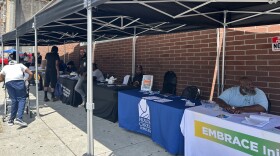Baltimore’s metro stations will soon hold boxes containing free naloxone, an opioid overdose reversal drug, as part of the city’s efforts to reduce drug deaths.
The Naloxone ONEboxes will be stationed in all of the city’s 14 metro stations, both above and below ground. The boxes, which are purple and white and look like first-aid kits, are affixed to the wall. Once opened, the boxes have the reversal drug, personal protection equipment and a screen inside. The screen plays a video when the box is open, which instructs people in English and Spanish on how to use naloxone.
“As a part of our citywide overdose response strategic plan, my team has been working to make sure that naloxone is readily accessible and that as many residents as possible know how to use it,” said Mayor Brandon Scott, speaking at the Penn North Metro Station Monday.
The boxes are paid for by the Opioid Restitution Fund, which holds money the city won in settlements from opioid companies.
The ONEboxes are part of a grant with the Maryland Peer Advisory Council (MPAC), which won a $2 million grant with the city to help reduce overdoses.
“The sites that we're creating are called purple sites,” said Tiffany Scott, president and CEO of MPAC. “We have one at Shake & Bake Family Fun Center, one in the library and other places too, such as businesses. We want to put them where people thrive, you know, and you know, and even if they're not thriving, just create a place where you can get access to it.”

The boxes are a product of the West Virginia Drug Intervention Institute and run between $50 and $150 depending on the model.
University campuses all over the nation are placing ONEboxes in high traffic areas to prevent overdoses.
The city unveiled the initiative in the Penn North neighborhood, which has had three mass overdose incidents in three months.
In total about 42 people have fallen victim to mass overdoses in the neighborhood since July 10.
No one has died from the mass overdose incidents, however, the problem continues to happen in the area.
The most recent incident in early October was likely caused by a powerful animal sedative called Medetomidine mixed with opioids.
“Unlike typical opioid overdoses, medetomidine intoxication may require different management strategies due to prolonged sedation, bradycardia, and hypertension despite standard-of-care overdose treatment,” a study from the Journal of Addiction Medicine states.
Baltimore is now handing out test strips for Medetomidine.











